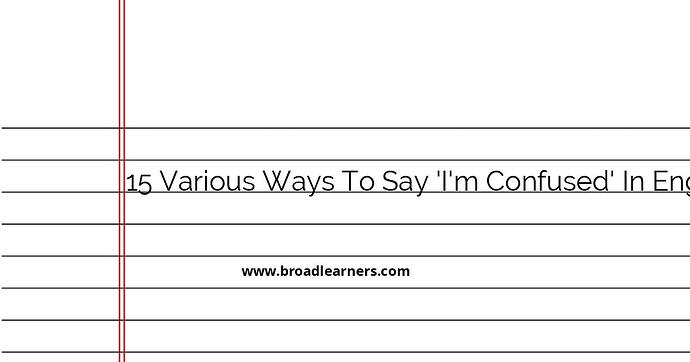Do you find yourself frequently saying 'I'm confused' and want to expand your vocabulary? Look no further! This article will provide you with 15 different ways to express confusion in English.
- I'm at a loss
- I don't understand
- I'm puzzled
- I'm bewildered
- I'm perplexed
- I'm flummoxed
- I'm stumped
- I'm in a fog
- I'm disoriented
- I'm muddled
- I'm mixed up
- I'm confounded
- I'm at sixes and sevens
- I'm in a quandary
- I'm in a haze
Now, let's take a closer look at each of these expressions:
1. I'm at a loss
This phrase is used to convey a sense of confusion or uncertainty. It suggests that you don't know what to do or say in a particular situation.
Example: 'I'm at a loss for words. I don't understand why he reacted that way.'
2. I don't understand
This is a straightforward way to express confusion. It indicates that you are unable to comprehend something.
Example: 'I don't understand the instructions. Can you explain them to me?'
3. I'm puzzled
If you're puzzled, you're feeling confused or uncertain about something. It implies that you're trying to figure out a solution or make sense of a situation.
Example: 'I'm puzzled by her sudden change in behavior. I don't know what caused it.'
4. I'm bewildered
When you're bewildered, you're completely perplexed or confused. It suggests a state of feeling lost or disoriented.
Example: 'I'm bewildered by the conflicting information. I don't know what to believe anymore.'
5. I'm perplexed
If you're perplexed, you're deeply puzzled or confused. It implies that you're struggling to understand or find a solution to a problem.
Example: 'I'm perplexed by the results of the experiment. They don't match our expectations.'
6. I'm flummoxed
This informal expression means that you're completely bewildered or confused. It suggests a state of being utterly perplexed or at a loss for words.
Example: 'I'm flummoxed by the riddle. I can't figure out the answer!'
7. I'm stumped
If you're stumped, you're unable to find a solution or answer to a problem. It implies a sense of being completely puzzled or unsure.
Example: 'I'm stumped by this math problem. I can't figure out how to solve it.'
8. I'm in a fog
If you're in a fog, you're feeling mentally confused or disoriented. It suggests a state of being unable to think clearly or understand a situation.
Example: 'I'm in a fog today. I can't seem to concentrate or make sense of anything.'
9. I'm disoriented
If you're disoriented, you're feeling confused or lost. It implies a sense of being unable to find your bearings or understand your surroundings.
Example: 'I'm disoriented in this new city. I don't know which way to go.'
10. I'm muddled
When you're muddled, you're feeling confused or mixed up. It suggests a state of being mentally unclear or unable to sort things out.
Example: 'I'm muddled by all the different options. I don't know which one to choose.'
11. I'm mixed up
If you're mixed up, you're feeling confused or mistaken. It implies a sense of being mentally jumbled or unable to keep things straight.
Example: 'I'm mixed up with the dates. I thought the event was tomorrow.'
12. I'm confounded
When you're confounded, you're feeling perplexed or puzzled. It suggests a state of being completely baffled or unable to understand something.
Example: 'I'm confounded by his behavior. I can't make sense of why he did that.'
13. I'm at sixes and sevens
If you're at sixes and sevens, you're feeling confused or disorganized. It implies a sense of being unable to make sense of things or establish order.
Example: 'I'm at sixes and sevens with all the different tasks. I don't know where to start.'
14. I'm in a quandary
If you're in a quandary, you're feeling uncertain or unsure about what to do. It suggests a state of being stuck or facing a difficult decision.
Example: 'I'm in a quandary about which job offer to accept. They both have their pros and cons.'
15. I'm in a haze
If you're in a haze, you're feeling mentally confused or unclear. It implies a sense of being in a foggy or dreamlike state.
Example: 'I'm in a haze after staying up all night studying. I can't think straight.'
Now you have a variety of options to choose from when expressing confusion. Remember, using different phrases can help you communicate your thoughts and feelings more precisely. Practice incorporating these expressions into your conversations to expand your vocabulary and improve your fluency in English.
Did I miss anything? Respond below
